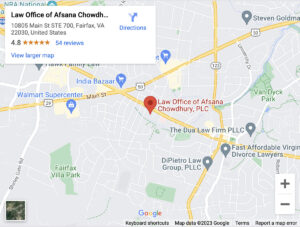
Child custody can be one of the most contentious issues in a Fairfax divorce case. Each parent might believe they should have custody of their child.
Unfortunately, some people use their children as a weapon against the other parent. They might cross the line during a custody battle by trying to alienate a child from their other parent. Parental alienation can be extremely detrimental to a child.
What Is Parental Alienation?

Parental alienation is a manipulative and deceptive tactic a parent uses to drive a wedge between their child and the child’s other parent. It is an intentional campaign of unjustifiable negativity aimed at the other parent to destroy or damage the child’s relationship with that parent.
The parent engaged in this conduct attempts to manipulate the child to turn them against their other parent.
Examples of parental alienation include, but are not limited to:
- Lying to a child about the other parent
- Undermining the other parent
- Accusing the other parent of false motives
- Telling a child the other parent does not love them as much or does not want them
- Constantly making disparaging remarks about a parent
- Limiting a child’s visitation with the other parent but blaming the other parent for missing visits
- Encouraging a child to reject the other parent
- Sharing the details of the divorce and child custody battle with the child
- Falsely accusing the other parent of domestic violence
- Making negative remarks about the other parent’s family and friends
- Intercepting messages and calls from the other parent
- Lying about the other parent’s parental rights
- Falsely claiming that the other parent will not pay child support or refuses to buy the child what they need or want
The alienating parent may or may not be the custodial parent. While it is easier for a custodial parent to engage in alienating behaviors because the child is with them most of the time, a parent can find ways to engage in alienating tactics. A parent might also include their family members by asking them to engage in alienating conduct.
What Are the Signs and Consequences of Parental Alienation?
Children subjected to parental alienation may begin to act very differently, especially toward the alienated parent. Children might display several signs of parental alienation.
Things to look for include:
- Hatred of the other parent
- A child “parrots” the alienating parent
- Lack of guilt about negative attitude toward the alienated parent
- Fear of being with the alienated parent
- Hatred of the alienated parent’s family and friends
- Defending the alienating parent’s behavior
- The unwavering support of the alienating parent
- False accusations or unrealistic beliefs about the alienated parent
Children exposed to manipulation and deception by a parent can experience severe emotional problems. In some cases, the stress of alienation can result in health and behavioral problems.
Consequences of parental alienation for a child can include:
- Self-destructive behavior
- Depression
- Low self-esteem
- Lack of trust
- Self-hatred
- Engaging in unhealthy relationships
- Decrease in grades or school performance
- Lack of interest in favorite activities
Some mental health and child psychology professionals describe parental alienation as child abuse because of the harmful effects it has on a child. Children might need intensive therapy to overcome the effects of parental alienation.
How to Prove Parental Alienation in Fairfax, Virginia
It can be challenging to prove parental alienation. Generally, the only witness is your child.
However, the child typically sides with the alienating parent, which is precisely what your ex-partner wanted to achieve. Forcing a child to testify against a parent can be harmful, especially if the child is already traumatized by the parental alienation. A judge will decide whether your child can testify in court based on advice from medical and mental health experts.
You must have evidence to prove that your child’s other parent has engaged in behavior intended to alienate your child against you.
Evidence could include:
- Counselor and therapist testimony after they spend time with your child, including whether your child is suffering from parental alienation syndrome
- Social media posts, emails, text messages, and voicemails
- Affidavits and testimony from individuals who witnessed the alienation
- Detailed notes documenting the alienating behavior, including dates
- A log of every attempt you made to contact your child and the outcome of that attempt
The court may appoint a Guardian ad Litem (GAL) to represent your child’s interests in a parental alienation case. The GAL investigates the parental alienation allegations by interviewing people with knowledge of the parental alienation, including the child’s teachers, coaches, therapists, and family members. They also interview the child and each parent.
A GAL assesses the child’s home and relationship with both parents. They will file a report with the court.
However, the Guardian’s opinion is not the final decision in the case. It is only one piece of evidence the court uses to decide if a parent has engaged in alienating conduct.
What Happens When a Judge Finds a Parent Guilty of Parental Alienation in Virginia?
Decisions regarding child custody and visitation in Virginia are made in the best interest of the child. Section 20-124.3 of the Code of Virginia lists the factors a judge must consider when deciding what is in a child’s best interest. The judge can consider any other factors that they deem necessary to make a determination.
If a judge finds a parent guilty of parental alienation, they could take several steps to protect the child. The judge may grant the alienated parent sole physical and legal custody. The judge could also order supervised visitation so that the alienating parent cannot try to manipulate the child.
A judge may order mandatory counseling for the child and/or parents. In some cases, family counseling could be ordered, or the judge may order the alienating parent to attend counseling and/or co-parenting classes. It depends on the circumstances and facts of the case.
Contact Our Fairfax Child Custody Lawyers for Help Proving Parental Alienation
Our lawyers at The Law Office of Afsana Chowdhury, PLC will work to protect the best interests of your children. Contact our law firm at (703) 271-6519 to schedule a confidential consultation with one of our Fairfax child custody attorneys.

